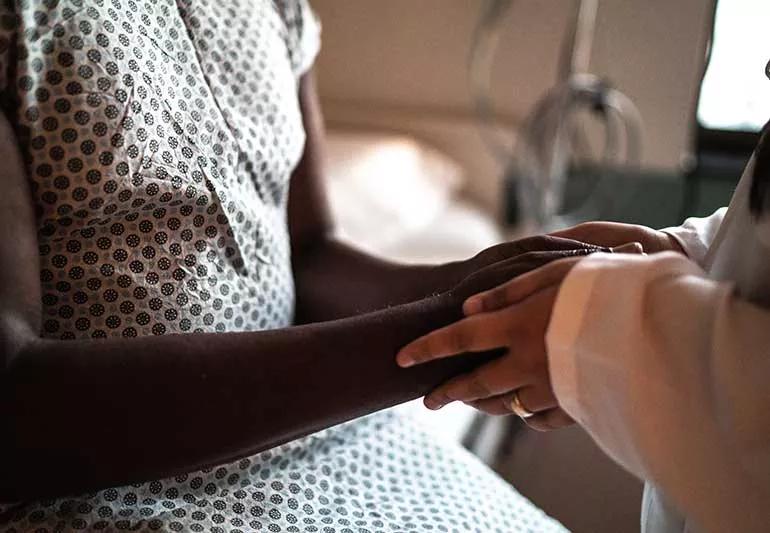Newer medications pivotal for improving gastrointestinal symptoms in patients with cancer

Though gastrointestinal (GI) symptoms are common during cancer treatment, the trajectory of these symptoms has vastly improved in recent years. In the majority of cases, GI symptoms can be controlled with medication.
Advertisement
Cleveland Clinic is a non-profit academic medical center. Advertising on our site helps support our mission. We do not endorse non-Cleveland Clinic products or services. Policy
“It hasn’t always been that way,” says David Harris, MD, a palliative medicine physician at Cleveland Clinic. “The perception for a long time has been that if you’re getting chemo, you’re stuck with nausea. People remember their parents or grandparents constantly vomiting during chemo. It doesn’t have to be that way anymore. It’s important for patients to know this, because sometimes they will refuse chemo because they’re understandably concerned about feeling like that.”
Oncologists, hematologists and surgeons treating patients with cancer would be well served to engage palliative care at the point of diagnosis, to help get ahead of symptoms.
One of the most notable advancements has been the development of NK1 inhibitors for treating chemo-induced nausea. Some older medications that were originally developed as antipsychotics have also been highly effective at treating nausea. “Olanzapine and haloperidol have been used to treat patients with schizophrenia and other psychotic disorders, but caused considerable sedative effect,” Dr. Harris explained. “What we discovered is that when giving either of these in much lower doses, we can control nausea with minimal sedation. It’s been a real game changer for the population I treat.”
These days, it is rare for GI symptoms to remain unresolved after palliative care becomes involved. In those roughly 10 percent of cases where symptoms aren’t controlled by medications, the palliative care physician brings together a multidisciplinary team, including oncologists, radiation oncologists and interventional surgeons, to determine more potent options for symptom management. For refractory cases, treatment may include surgery, smaller interventional procedures or radiation, depending on the particulars of the case.
Advertisement
When palliative medicine begins working on a case, they spend considerable time talking with the patient to determine exactly what each symptom feels like and to understand related factors. When it comes to pain, the physicians look beyond the traditional pain scale used in a hospital, focusing more on how pain is affecting a patient’s ability to function at home. This offers a clearer understanding of how to improve that patient’s quality of life. “There are so many factors that can cause pain in people with cancer, so it’s essential to spend time understanding when the feelings started and how severe they are,” says Dr. Harris.
From there, palliative care collaborates with the treating oncologist/hematologist and conducts a detailed workup, often ordering imaging to rule out obstructions, as well as bloodwork to check electrolytes and other factors that could affect the GI tract.
Advertisement
Though the medication has been studied, the previous research didn’t include hospital settings, where constipation can be more severe due to dehydration and limited mobility often found in hospitalized patients. Dr. Harris and his colleagues conducted a retrospective study of 194 patients evaluating the effectiveness of methylnaltrexone to alleviate constipation in hospitalized patients receiving opioids during cancer treatment.
In the study, 45 percent of patients had a bowel movement within 24 hours of receiving an IV dose of methylnaltrexone. The response rate was heavily associated with the amount of opioid given. Higher rates of oral morphine or morphine equivalent were associated with successful bowel movements, at a rate of 93 percent. Based on these results, Dr. Harris is considering using methylnaltrexone when opioid requirements are high, though he notes that further studies would be beneficial to determine where the medication sits in terms of priority.
Ultimately, palliative medicine is an integral member of care teams for reducing pain and managing other GI symptoms. They bring expertise in symptom management, freeing oncologists, hematologists and surgeons to focus on the treatment and other factors.
Learn more about symptom management and palliative care.
Advertisement
Advertisement

Palliative care specialists know hard conversations can also be valuable ones

Genetic variants exist irrespective of family history or other contributing factors

Integrated care model reduces length of stay, improves outpatient pain management

Percutaneous stabilization can increase mobility without disrupting cancer treatment

Palliative nurses improve quality of life

New guidelines update recommendations

Simple score uses clinical factors to identify patients who might benefit from earlier screening